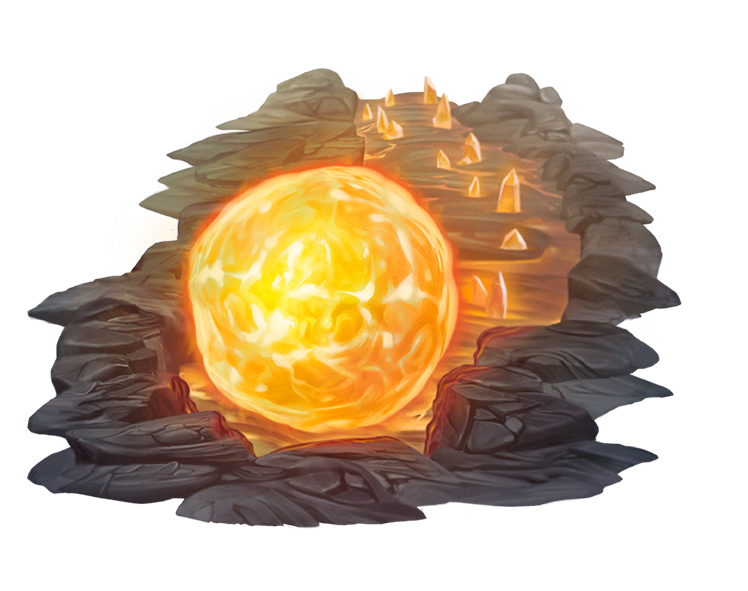Solar WispSource Alien Archive 2 pg. 116
Life exists in myriad forms across the universe, dwelling everywhere from the vast depths of space to the heart of a star—and the places in between. Solar wisps are blobs of ejecta from a sun’s corona that have taken on a modicum of sentience. No one is exactly sure how solar wisps originate, though some believe it is Sarenrae’s divine will, while others point toward a consciousness similar to that of elementals, claiming that solar wisps are nothing more than cousins of fire elementals. But while it is true solar wisps are amorphous orbs of burning plasma with almost animal-level intelligence, the similarities end there. These creatures have a long and unique life cycle that begins in a star and can end in calamity.
When a solar wisp is “born,” it measures about 20 feet in diameter, but the material of its being is loosely held together by minor gravitational forces. At this point, a solar wisp isn’t much more than a red-hot cloud of colloidal matter. Driven by instinct, the solar wisp attaches itself to a nearby fast-moving celestial body (usually a comet), which eventually takes it close to a planet or moon containing the minerals on which the solar wisp feeds. As it burns its way across such a landscape, the solar wisp gains more mass but shrinks in size. Responding to unknown stimuli, the solar wisp launches itself back into space to latch onto another comet or meteor to repeat the process.
As a solar wisp feeds and ages, it increases in density but decreases in diameter. Despite its reduction in size to a mere few feet in diameter, a mature solar wisp burns with far greater intensity and is much more dangerous than a juvenile. A solar wisp of any age and size can pose a threat, however, as it is unwavering in its pursuit of food, consuming the minerals it seeks out in its internal furnace. This can be a destructive process that puts it in conflict with other species—especially if those species also rely on the same minerals for economic stability. Most creatures that attempt to stop a mature solar wisp underestimate its abilities thanks to its small size. Its effects on local gravity and its intense heat mean that most who confront a solar wisp are lucky if they get away with only severe burns.
Though it has a life span measured in centuries—and sometimes multiple thousands of years—a solar wisp does eventually die. An elderly solar wisp is a tiny ball that burns like a nuclear explosion, and when it expires, it implodes into a gravitational singularity that affects a half-mile radius. Though this miniature black hole lasts for less than an hour, it poses a great danger to those caught in its pull. A recent report from Near Space tells of an entire nascent colony wiped out by a dying solar wisp that, until then, had served as a kind of mascot and beacon for the unfortunate settlers. Photino CrystalsIn their travels, solar wisps sometimes shed portions of themselves, which cool rapidly into a glittering stream of beautiful bright-orange jewels called photino crystals that are used throughout the Pact Worlds (and beyond) as naturally occurring solarian weapon crystals. A few small starship crews make a dangerous living by following wisps— at a great distance—and waiting for this molting, scooping up the resulting jewels until their cargo holds are full, and then returning to a safer location to sort them by quality. Despite the danger inherent in collecting the gems, these solarian weapon crystals are widely available, especially in the sun’s Burning Archipelago in the Pact Worlds; aboard the kasathan worldship the Idari; and in Fullbright, Verces’s scorched, sun-facing hemisphere.Aliens in the "Solar Wisp" FamilySource Alien Archive 2 pg. 116Mature Solar Wisp CR 19 XP 204,800 XP 204,800
N Small outsider (air, elemental, fire, native)
Init +11; Senses darkvision 60 ft.; Perception +32
Aura gravitational pull aura (120 ft.)DefenseHP 400
EAC 34; KAC 35
Fort +22; Ref +20; Will +16
Defensive Abilities void adaptation; Immunities elemental immunities, fire, radiation
Weaknesses vulnerable to coldOffenseSpeed fly 60 ft. (Su, perfect)
Melee slam +31 (15d6+28 F)
Ranged solar ray +34 (8d8+19 F; critical burn 6d6)
Offensive Abilities conflagration, stellar heatStatisticsSTR +9; DEX +11; CON +6; INT -3; WIS +0; CHA +0
Skills Acrobatics +37 (+45 to fly)
Other Abilities aglow (90 ft.), solar adaptation, spaceflightEcologyEnvironment temperate or warm land or vacuum
Organization solitarySpecial AbilitiesAglow (Ex) A solar wisp increases the light level by one step out to a radius of 10 feet × half the solar wisp’s CR.
Conflagration (Ex) Once every 1d4 rounds as a standard action, a mature solar wisp can hurl a portion of its burning form at a grid intersection within 120 feet, at which point the flames detonate, dealing 10d6 fire damage to all creatures within a 20-foot-radius burst. An affected creature can attempt a DC 24 Reflex saving throw to halve the damage.
Gravitational Pull Aura (Ex) A creature within 120 feet of a mature solar wisp has its speed reduced by half when it moves away from the solar wisp, and can move at double its speed when moving toward the solar wisp.
Solar Ray (Ex) A mature solar wisp can project an intense ray of light as a ranged attack against a target within 240 feet.
Stellar Heat (Ex) A creature adjacent to a mature solar wisp takes 3d12 fire damage from the intense heat that the elemental radiates. A creature that succeeds at DC 24 Fortitude save takes half this damage.
|